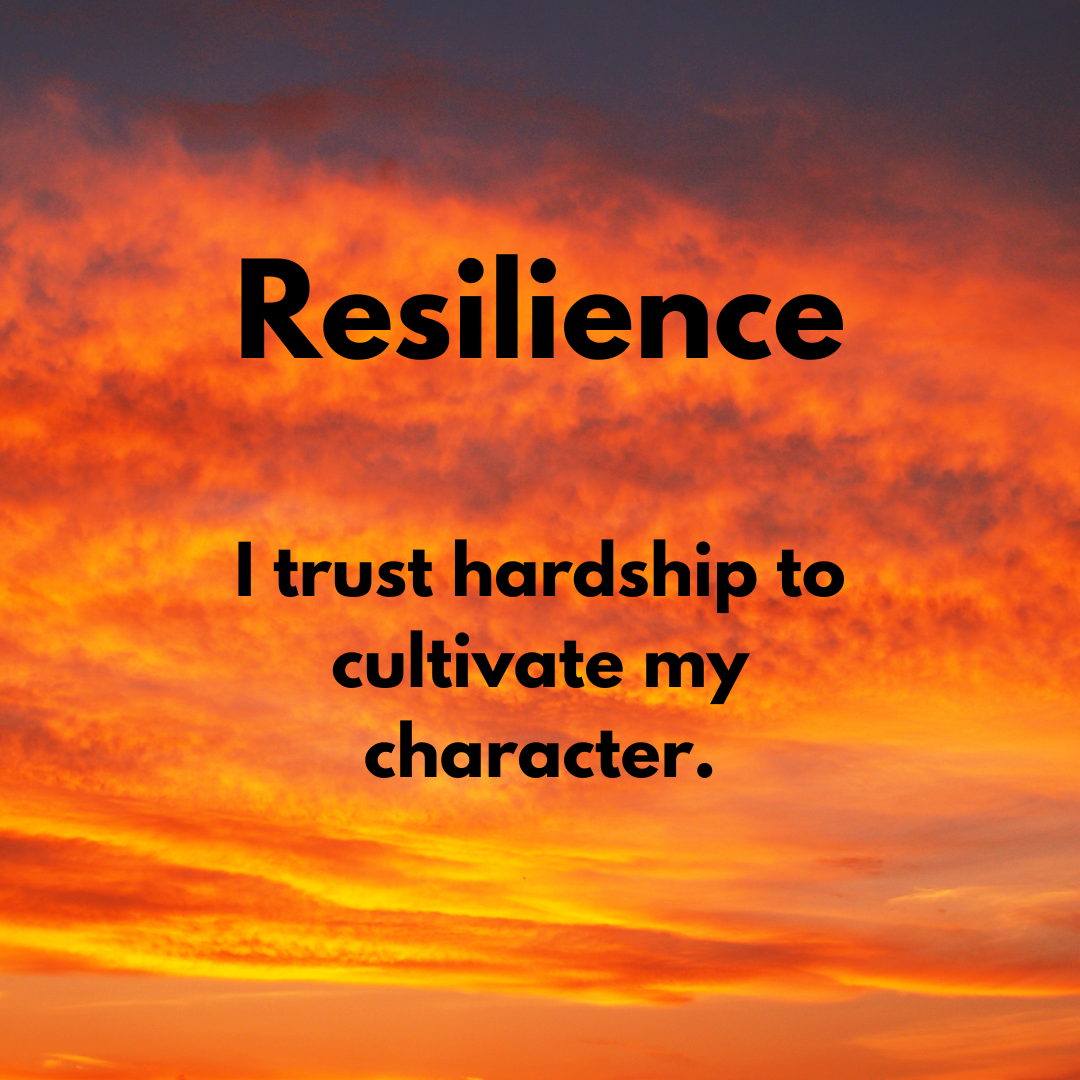Description

Resilience is the inner strength that allows us to rise above life’s challenges and persevere, no matter how difficult the circumstances. It is the ability to bounce back from adversity, whether it be disappointment, loss, or hardship. When life knocks us down, resilience helps us get back up, with hope as our guide and courage as our fuel. It is not about avoiding pain but about facing it with a spirit of endurance and grace.
Resilience is not about perfection but about progress. It’s about embracing life fully, even when it is unpredictable and difficult. It is the virtue that empowers us to keep moving forward, learn from hardship, and find new ways to thrive.
Resilience allows us to find lightness in dark moments, using humor and perspective to lighten the load. It teaches us that challenges are not the end of the road but part of the journey. We tap into our inner reserves of faith, knowing that there is strength within us to overcome even the most challenging obstacles. And when we face loss, resilience helps us grieve, heal, and eventually find joy again. It reminds us to lean on others for comfort and to rebuild with renewed purpose.
Affirmations for Resilience
1. I am stronger than my challenges.
This reminds you of your inner strength and capacity to overcome obstacles, reinforcing confidence in yourself.
2. I choose to focus on solutions, not problems.
Shifting your mindset to solutions empowers you to take proactive steps forward rather than feeling stuck in the problem.
3. Every setback is an opportunity for growth.
By reframing setbacks as learning experiences, you foster a positive outlook and develop resilience by seeking personal growth.
4. I can handle whatever comes my way.
This affirmation affirms your ability to face life’s unpredictability, helping you feel prepared and capable, no matter the challenge.
5. It’s okay to take one step at a time.
Patience and persistence are key to resilience. Reminding yourself to focus on small steps prevents overwhelm and burnout.
6. I embrace change and adapt with grace.
Accepting change as part of life helps build flexibility, which is vital in navigating tough times with resilience.
7. I have survived difficult moments before, and I will survive this.
This taps into past experiences of overcoming adversity, helping you draw strength from your history of resilience.
8. I release what I cannot control and focus on what I can.
Letting go of control over things outside of your power reduces stress and allows you to concentrate on effective actions.
9. I trust that everything unfolds in time.
Trusting in the process allows you to let go of the pressure for immediate solutions, encouraging patience in adversity.
10. I am allowed to feel, but I will not stay stuck in those feelings.
Acknowledging emotions is important for healing, but this affirmation reminds you not to dwell on them, encouraging emotional resilience.
Quotes
“That which does not kill us makes us stronger.” — Friedrich Nietzsche
“When we are no longer able to change a situation, we are challenged to change ourselves.” — Viktor Frankl
“We rejoice in our sufferings, knowing that suffering produces endurance, and endurance produces character, and character produces hope.” — The Bible – Romans 5:3-4
Resilience In Family Life
Resilience in family life is the ability to face challenges together with strength, adaptability, and hope. For parents, resilience means modeling calmness and determination when life brings difficulties, showing children how to navigate setbacks without being overwhelmed. It’s about finding ways to keep moving forward as a family, whether the challenge is a big life event or a small daily struggle. Resilient parents teach their children that tough times are part of life, and they can be faced with courage, patience, and a belief in better days ahead.
For children, resilience is learning that it’s okay to make mistakes, feel sad, or be frustrated, but it’s important to get back up and try again. Families that practice resilience encourage open communication about emotions, finding solutions together, and offering support when anyone stumbles. Humor, love, and a sense of belonging help lighten the load, reminding everyone that they are not alone in hard times.
Resilient families grow stronger by facing challenges as a team. They trust in each other’s strength and help each member become more confident, knowing that no matter what comes their way, they can handle it together.
Balancing Resilience
Balancing Virtues to Cultivate Resilience:
-
-
- Vulnerability: Embracing vulnerability allows individuals to acknowledge their emotions authentically, fostering genuine connections with others and cultivating inner strength through self-awareness.
- Self-Compassion: Practicing self-compassion enables individuals to extend kindness and understanding to themselves in times of struggle, nurturing resilience by fostering a supportive inner dialogue.
- Adaptability: Developing adaptability empowers individuals to respond flexibly to life’s challenges, recognizing that resilience is sheer endurance, adaptability, and growth.
- Mindfulness: Cultivating mindfulness fosters present-moment awareness, helping individuals navigate adversity with clarity and equanimity and enhancing resilience by promoting emotional regulation and stress management.
-
In finding harmony among these virtues, we unlock the true essence of resilience—the ability to rise, adapt, and thrive amidst adversity.
Joe is a husband, father, grandfather, author, speaker, educator, course creator, and parent/family coach.
He helps parents develop unity, find clarity, communicate, and develop consistency in their parenting with the Four C’s of Successful Families. You can find his work on social media.
In addition, the Four C’s newsletter is enjoyed by many as it encourages parents to self-care, build their relationships with their partners, and raise their children.
And he loves to golf!

